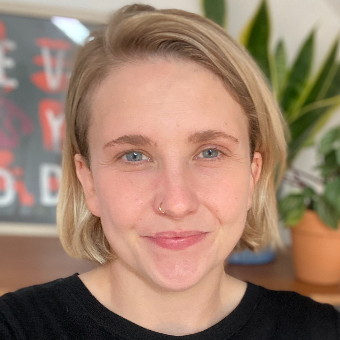Rachel McKane
 Jack Meyerhoff Chair in American Environmental Studies and Assistant Professor of Sociology
Jack Meyerhoff Chair in American Environmental Studies and Assistant Professor of Sociology
Rachel McKane is an environmental sociologist with research and teaching interests in environmental justice, spatial inequality, urban political economy, and mutual aid.
Their primary research agenda explores the connection between environmental justice and processes of urban change rooted in racial capitalism, city development, and present and historic housing inequality. This research agenda is driven by a broad set of questions, including: What are the spatial and temporal scales of urban environmental justice struggles? How can multiscalar analyses guide cities towards centering justice in their sustainability efforts? This work applies a critical environmental justice (CEJ) lens to interconnected ecological and urban crises by deepening our understanding of the spatial and temporal scales of environmental justice struggles. Their most recent project explores the environmental legacy of redlining, racially restrictive covenants, and residential segregation.
Professor McKane’s secondary research agenda explores community-based approaches to environmental justice through networks of solidarity and mutual aid. One manuscript, forthcoming at Environmental Justice, brings critical environmental justice into closer conversation with critical disability studies by exploring how disabled communities, predominantly queer, trans, and BIPOC, leverage mutual aid as adaptive strategy to climate change.
After obtaining their PhD from Vanderbilt University, they worked as a postdoctoral research associate at Brown University in the Population Studies and Training Center (PSTC) in the Spatial Structures in the Social Sciences (S4) program on projects pertaining to redlining, housing inequality, and residential segregation. They also contributed to the Longitudinal Tract Data Base (LTDB), a public-use tool that harmonizes spatial boundaries of historic and contemporary data from the U.S. Census.
Professor McKane’s articles appear in Environmental Research Letters, Environmental Justice, Environmental Sociology, Local Environment, Environment and Planning A: Economy and Space, Cities, Environmental Politics, Energy Research and Social Science, Social Science History, and Mobilization.
Education
-
PhD, Sociology, Vanderbilt University
-
MA, Sociology, Vanderbilt University
-
BA, Global Studies (Political Economy), University of Tennessee
Publications
-
Rachel McKane, David Pellow, and Patrick Greiner. “Envisioning Disabled Futures: Mutual Aid ad an Adaptive Strategy to Climate Change and Ecological Disablement.” Forthcoming, Environmental Justice.
-
Patrick Greiner and Rachel McKane. 2022. “Does Racism have Inertia? A Study of Historic Redlining’s Impact on Present-Day Association between Development and Air Pollution in U.S. Cities.” Environmental Research Letters. DOI:10.1088/1748- 9326/ac9070
-
Rachel McKane and David Hess. 2022. “The Impact of Ridesourcing on Equity and Sustainability in North American Cities: A Systematic Review of the Literature.” Cities. DOI:10.1016/j.cities.2022.104122
-
David J. Hess and Rachel McKane. 2021. “Making Sustainability Plans More Equitable: An Analysis of 50 U.S. Cities.” Local Environment. DOI: 10.1080/13549839.2021.18920477
-
David J. Hess, Rachel McKane, and Kaelee Belletto. 2021. Advocating a Just Transition: Civil Society and Industrial Change in a Carbon-Intensive Region. Energy Research and Social Science. DOI:10.1016/j.erss.2021.102004
-
David J. Hess, Rachel McKane, and Caroline Pietrzyk. 2021. End of the Line: environmental justice, energy justice, and opposition to power lines. Environmental Politics. DOI:10.1080/09644016.2021.1952799
-
Rachel McKane and Holly McCammon. 2019. “Why We March: The Role of Grievances, Threats and Organizational Resources in the 2017 Women’s Marches.” Mobilization. DOI:10.17813/1086-671X-23-4-401
-
Rachel McKane, Lacee Satcher, Stacey L. Houston II, and David J. Hess. 2018. “Race, Space, and Waste: An Intersectional Approach to Environmental Justice in New York City.” Environmental Sociology. DOI: 10.1080/23251042.2018.1429177